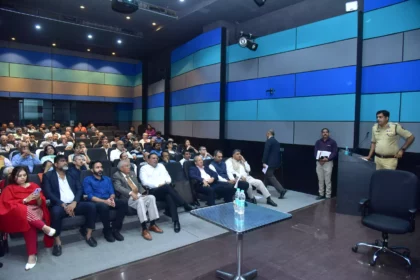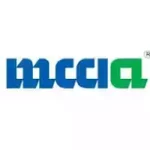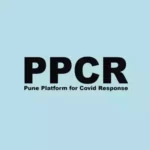
Speakers:
- Mr Manoj Patil – Additional Commissioner Police
- Dr. Sudhir Mehta – Founder, PPCL s Chairman s MD, Pinnacle Industries Ltd. Pratap Singh Bhonsle – Founder, Global Traffic Solutions
- Nishit Kamath – Trasport Systems Strategist s Designer
Moderator:
- Ajay Aggarwal – Convener, My Pune Dialogue s Director, Community Service, TMCF
Audience:
- Around 80 (members of TMCF, PPCL, Corporate leaders, active citizens and media)
Meeting started with welcome address by Mr. Ashwini Malhotra, President TMCF and Managing Director, Weikfield Food Products Ltd and giving the background of Top Management Consortium Foundation and its activities and annual awards. TMCF has been working with the city of Pune since 1985 on various civic issues along with appropriate authorities and administrators. In its quest to make a larger impact now and how TMCF has now conceived the concept of My Pune Dialogue
along with PPCR.
Dr Sudhir Mehta, Chairman s Managing Director – Pinnacle Industries Ltd s Founder- PPCR shared the background of Pune Platform for Collaborative Response (PPCR) and the nature of contribution it made to Pune and other cities through its work during the Covid crisis and post that PPCR has now evolved in taking up key city issues and collaborate with authorities and other bodies to find solutions and bring about possible solutions. Dr Mehta also emphasized how PPCR is collaborating with Traffic Police on arterial roads project. He also firmed up PPCR’s commitment to actively work with TMCF on My Pune Dialogue and its impact on the city.
Ajay Aggarwal briefed on the concept of My Pune Dialogue. We at TMCF feel that the biggest
stakeholders of every city are its citizens and there is a need to work with citizens and citizen bodies to find solutions to the key problems. My Pune Dialogue shall be focusing on Traffic, Environment and Infrastructure related issues of the city of Pune. My Pune Dialogue will bring experts, authorities and citizens together on this platform to prioritize issues and brainstorm possible solutions. It will
also work with experts to carry out closed door workshops to crystalize some possible ideas on identified issues. Apart from this, it is also committed to reach out to large number of citizens as corporate employees to advocate on best practices with the objective of influencing citizen’s behavior on issues like traffic and environment. My Pune Dialogue will also start working on a
citizen’s platform, My Pune to engage with citizens on issues and invite their participation in being an influencer of best practices.
Mr Manoj Patil, Additional Commissioner of Police made a detailed presentation on the issues identified and possible solutions, long term, medium term and short term. Key highlights of his presentation are:
What are the issues?
- With a population of 10 million, Pune region now has 2 million registered vehicles, and 1300 new vehicles are added every day. 62% of these are 2-wheelers.
- Only 6% of land space in the region is covered by roads whereas as per UDCPR it should not be less than 15%. Pune has only 2200 KM of roads and 60% of these are narrow roads, less than 20 ft This reduces the road space available to its citizens for commuting.
- No Ring Road and its rapid urban growth has happened around radial roads which has led to radial dependence and congestion on available roads, especially in the core of the
- Current use of public transport is just 17% whereas in the cities like Mumbai and Delhi it is 50% and above.
- In the current scenario public transport share is just 19% and Car C Bike share is 71% of road trips and if we don’t take any measures now then public transport share will drop to 12% and private vehicle share will increase to 76%. Present proposed projects are aimed at improving public transport share to 40% and reducing private vehicle share to 53% by This itself will not be enough.
- Poor road infrastructure and over population of private vehicles on the roads has led to congestion and traffic indiscipline in the city leading to slow movement as well as higher accidents
Identified Solutions:
Based on the scientific analysis of the data collected through various surveys, he presented long term solutions with high cost involved and medium- and short-term solutions with not so much time and cost involved. In fact, some of these can be implemented in weeks and months. Also, how to optimize the existing road infrastructure to maximize the use and improve the travel time.
Low cost quick to implement solutions are design improvement of existing roads, repair and maintenance, traffic management techniques, last mile connectivity using feeder vehicles and public cycles, and travel demand management techniques. These can make an impact in weeks and months.
Some of the Travel Demand Management Techniques are:
- Common ticketing for all public transit and NMT
- Feeder buses/mini buses for last mile connectivity with Metro
- Distributing peak hour traffic by adjusting office and school
- Use of mobile applications for tracking travel behavior and encouraging public
Along with PMC Traffic Planners and under expert guidance the Traffic Police has prepared an Integrated Traffic Movement plan. One of the major problems is inadequacy of road network in the city. To improve it they need to first define the road hierarchy to connect the missing links. The focus
is on improving the roads capacity through efficient management and connecting the missing links in the road network. Under this plan they have identified 32 Arterial Roads (230 KM), 50 sub-arterial roads (96KM), and 15 Collector roads (69 KM). Connecting the missing links between these roads will enhance the overall capacity of the road network.
Some of the tasks to be taken up PMC under this plan are:
- Improve the quality of Arterial roads by removing potholes and waterlogging
- Proper streetlights, signages, road marking, synchronized
- Removal of encroachments and illegal hoardings too create space for roadside
- Removal or reshaping unnecessary road islands and speed
- Shifting priority bus stands away from signals, no hawker zones and organize pay-n-park on 32 Arterial roads.
- Mobile app for real-time monitoring of pot holes, repair work road data
Similarly, some of the tasks listed are to be taken up by the Traffic Police to improve traffic management.
- Minimize obstructive parking on Arterial roads and take strict action wrong
- Removal of illegal auto-taxi stands, removal oof luxury buses pick-up points and impose heavy vehicle
- More manpower and signal synchronization for Arterial roads
- Reduce traffic jams using mobile monitoring
- Right turn, U Turn ban, One way and other low-cost traffic management
- Regular and priority action against
- Monitor travel speed and vehicle count on Arterial
He also presented some examples of improving road capacity through missing links and removing bottlenecks like on Baner- Pashan Road, Nagar Road, Nanaware Underpass and few others.
He also expressed that citizens today avail of large amount of free parking spaces across the city, this needs to be regulated and brought under pay-parking models using telescoping parking fee models. This will discourage citizens from using private vehicles, especially in congestion zones.
Mr Patil also shared how Traffic Police is also focusing on enhanced enforcement through challans on violations. The challan rate is expected to go to three times in the next three months.
Though he also presented some ideas on medium term plan as well but as of now the focus is on these short term measures to achieve some quick success.
Following Mr Patil’s presentation, Pratap Singh Bhonsle, Founder- Global Traffic solutions presented his learnings from various projects undertaken by him in different cities in India. He is also closely working with Pune Traffic Police in Analysis based traffic management design projects. One of the key learnings he presented was that enhancement in road supply network only leads to increase in demand more than forecasted and this is not very viable.
His focus is on proving abundant public transport networks with last mile connectivity of quality footpaths, shittle services to feed Metro services, cycle paths etc. The key will be a reduction in walking time to access a public transport. Improving accessibility to public transport will be very important to enhance the usage of this network. As of now only 30% of meteor commuters are
walking to the station and only 11% are using bus service to reach there. This can be improved with enhanced infrastructure of walk ways and shuttle services with not more than 10 min frequency.
He also proposed analysis-based re-design and improvement of road and infra network to remove bottle necks, enhance capacity by re-designing curves and islands and chowks. He showed examples of some work done on Yashwant Nagar Chowk and Durgadi Chowk.
He also proposed Smart Automated Enforcement using AI Cameras on public transport capturing violations on the road while moving and issuance of automated challans for wrong parking and other violations.
Following this all panelists were subjected to open Q C A.
Mr Nishit Kamath explained the plan of working with Traffic Police on collecting required data and building improvement designs for 32 arterial roads across the city. This project is taken up by PPCR and a pilot on 3 identified arterial roads has already begun.
Topic of Helmet was also discussed and Mr Patil explained the complex issues associated with the implementation of this rule since Pune doesn’t seem to be very receptive of this and enforcement of Helmet rule always hits some roadblocks from local leaders as well as leading personalities of Pune.
Many participants in the audience had range of queries about smaller and local issues in their areas and we are now collating these issues in coordination with all participants to prepare a composite
list to work with the Traffic Police.
It was also decided that TMCF and PPCR will continue to engage with Traffic Police, experts and local Mohalla bodies to coordinate on issues to work on.
Next My Pune Dialogue shall be held towards the second half of December 2024. Dates will be announced soon.
If you wish to share your views and points to be taken up in future, please keep sharing with us at topmgmn@gmail.com or ajay@ajayaggarwal.net



